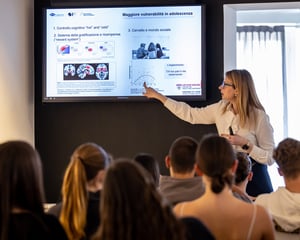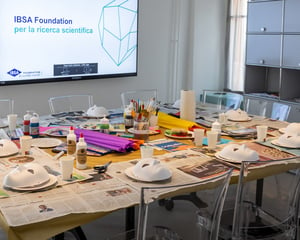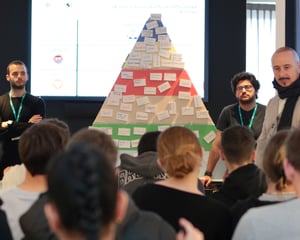
Happiness2.0
Social media use, AI and well-being in adolescence
Purpose of the initiative
Following the success of 2024, the Happiness2.0 project will continue for the 2024-25 and 2025-26 school years with the aim of offering more workshops (HappyLabs) to high school students in the Canton of Ticino. HappyLabs will also be offered to adults.
The aim of the new HappyLabs remains to stimulate active and informed reflection on issues related to digital technology. As usual, the mask workshop will be at the heart of the initiative, inviting participants to reflect on the very concept of masks in society, both real and virtual.
New: for the 2025 edition, thanks to the arrival of Lugano Living Lab, a new partner in the project, a highly topical theme will be introduced: artificial intelligence, which is particularly relevant today in the social media ecosystem.
HappyLab, what it is and how it works
HappyLab is an experiential workshop led by experts, designed to stimulate active reflection on issues related to digital technology and personal growth.
It combines theory and practical activities, involving participants in a direct and creative way.
Each meeting is an opportunity to explore, understand and discuss current and relevant issues.
The workshops consist of three parts.

Scientific Introduction
A scientific introduction that aims to engage and stimulate reflection among students.

Mask workshop
If we had to represent our digital identity on a real mask, what would it look like?

Well-being pyramid
What are your core values? How do they relate to or differ from your digital identity?
The experts involved
The workshops will be led by qualified experts in the fields of psychology and communication, who will guide the discussions and activities, drawing on their experience and expertise:
-
Laura Marciano, Harvard T.H. Chan School of Public Health, Lee Kum Sheung Centre for Health and Happiness and scientific director of the project;
-
Silvia Misiti: director of IBSA Foundation for scientific research;
-
Elena Marchiori: lecturer in digital communication at USI and project manager for Lugano Living Lab, City of Lugano;
-
Peter Schulz, professor of communication theory and health communication at USI;
-
Dario Gennari, Psychologist and Psychotherapist at the Rete Operativa medical practice;
-
Pietro Bianchi, Graduate in Psychology and Research Assistant in the Happiness 2.0 project at USI.
Project activities
HappyLab
The HappyLab includes two weeks (in Spring and Autumn 2024) of a 2-hour laboratory. It will be repeated twice per day, with one high school class (~ 20 students) invited per time, for a total of about 20 classes (~ 400 students in total).
It will include three parts:
- An introduction to communication concepts by a research expert;
- A practical activity inspired by creative literature examples on the role of “masks” as symbols of the difference between an online fictitious identity and a real identity. A debriefing with a mental health expert will follow;
- A reflection on what it means to be happy for them. Classical literature examples from Aristotle’s “The Nicomachean Ethics” will be read to define happiness (e.g., hedonic versus eudaimonic happiness). They will create a shared “Happiness2.0 Pyramid” (i.e., to define their happiness in the current state of the Internet, i.e. 2.0, including user-generated content via social media)
HappyApero
The HappyApero aims to foster communication between adolescents, scientists, and the adult public (including parents and teachers).
- A group of adolescents who participated in the HappyLab will be invited to share their experiences with other adolescents in a peer-to-peer interview format.
Adolescents will share their experiences with the adult public and ask questions to invited research experts.
HappyTable:
The HappyTable aims to summarize the Happiness2.0 project’s activities.In collaboration with the Culture Division, City of Lugano, we will invite all high school principals of Ticino, interested teachers, representatives from parental associations, and stakeholders working with adolescents in Ticino.
- We will deliver printed brochures with the project summary and we will promote the continuation of the HappyLab project for the following year, which will be based on the visual arts-in line with the IBSA Foundation's Culture and Health program.
Aim of the initiative
Happiness2.0 Lab includes a series of communication activities (HappyLab, HappyApero, and HappyTable) designed for adolescents, aiming at translating scientific results into practice, through the combination of science and arts.